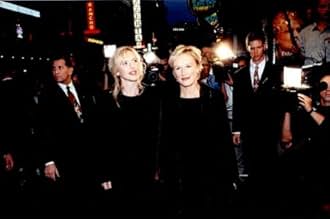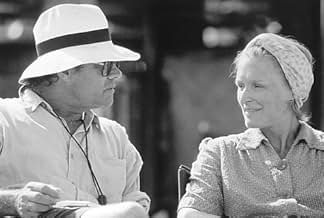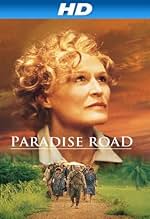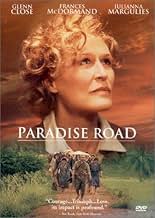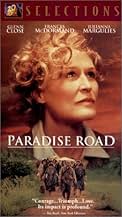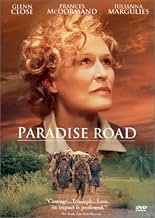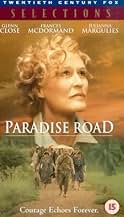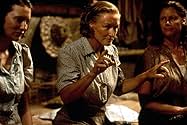PUNTUACIÓN EN IMDb
6,8/10
6,2 mil
TU PUNTUACIÓN
Añade un argumento en tu idiomaA group of women who are imprisoned on the island of Sumatra by the Japanese during World War II use music to relieve their misery.A group of women who are imprisoned on the island of Sumatra by the Japanese during World War II use music to relieve their misery.A group of women who are imprisoned on the island of Sumatra by the Japanese during World War II use music to relieve their misery.
- Dirección
- Guión
- Reparto principal
- Premios
- 1 premio y 7 nominaciones en total
Johanna ter Steege
- Sister Wilhelminia
- (as Johanna Ter Steege)
Reseñas destacadas
First class work here. The film follows a group of women captured in Asia by the Japanese, and interned as enemy aliens. It shows the inhuman brutality that the Japanese inflicted on anyone they considered to be of an inferior race. (i.e. not Japanese) (for that matter anyone not samurai) As a coping mechanism, and partially in defiance of their captors, the women form a vocal orchestra, playing the parts of classical music with only their voices. The music soothes the women, those in the orchestra, and those who aren't. The Japanese soldiers even come to enjoy the sound, and the atrocity rate drops a couple of notches.
Stand out performances abound here. In fact I can't really single out any of the cast. They were all good, including the Japanese actors. I had thought from the reviews that the music would be the largest part of the film, with just the backdrop of the prison camp, but it really wasn't. I recommend this film.
Stand out performances abound here. In fact I can't really single out any of the cast. They were all good, including the Japanese actors. I had thought from the reviews that the music would be the largest part of the film, with just the backdrop of the prison camp, but it really wasn't. I recommend this film.
The film was both moving and heart warming. It shows the unbelievable story of a group of women surviving a PoW camp against all the odds. I found it hard to believe that anyone was made to live in the conditions they were put in and live to tell the story. The acting was excellent and i don't think this film has got the praise it deserves. It is made even more moving by the fact it is based on a true story.
This film gripped me from the opening scene in the hotel ballroom and prooved to be a class act right to the end. Director Bruce Beresford's track record includes Driving Miss Daisy, Tender Mercies and Breaker Morant, so Paradise Road came as a special treat, not realising at the time of viewing that he had directed these films. The realistic scenes of violence had a tremendous impact in contrast to some of the wonderful underplaying of the leading actresses, notably Glenn Close and Pauline Collins. The Japanese actors, although unknown to me were chillingly effective. I can only hope for more films of this calibre but alas they are few and far between.
I found this a very moving film about a group of fairly ordinary people placed in extraordinary conditions. I found myself quite involved with all the acting and the story line. Here is a film filled with outstanding and understated performances about people's ideals and courage being tested.
As to this story having been told in 2 or 3 other movies, I find that to be an incredible comment. I didn't see anyone saying that there had already been about 100 movies about men fighting in World War II when "Saving Private Ryan" came out. It is time that the stories of these extraordinary women be told. Soldiers aren't the only ones to suffer and die in wars.
As to this story having been told in 2 or 3 other movies, I find that to be an incredible comment. I didn't see anyone saying that there had already been about 100 movies about men fighting in World War II when "Saving Private Ryan" came out. It is time that the stories of these extraordinary women be told. Soldiers aren't the only ones to suffer and die in wars.
Paradise Road is based on the true story of women POWs in Sumatra during WWII. The film, for the most part, follows what really happened... with one glaring exception!
The incident that is prominently missing from Paradise Road is the Bangka Island massacre, which was one of the worst atrocities committed against women POWs during WWII and is an integral part of this story.
After their ship, The SS Vyner Brooke, was sunk, the survivors made for the nearest land which was Bangka Island. They came to shore in different places but a group of more than a hundred people ended up on Radji beach. The group consisted of 22 Australian Army nurses, some civilian men, women and children, and 30 British soldiers from another ship which had been sunk. The island was fully occupied by the Japanese and the group unanimously decided to give themselves up. The group leader set off to find someone to surrender to. The civilian women and children began walking towards the main town on the island. The 22 nurses remained behind with the men and the soldiers (many of whom were badly wounded), an elderly British woman also remained with her wounded husband.
When the group leader returned with a group of 20 Japanese, they ignored all requests for surrender. The Japanese shot and bayoneted the men, then ordered the 23 women to walk into the ocean. When they reached waist depth, the Japanese open fired with a machine gun and mowed the women down.
There was one survivor. One of the nurses, Vivian Bullwinkel, was shot through the side and survived by pretending to be dead. She hid in the jungle for 12 days, caring for a British soldier who had been bayoneted and left for dead (he later died). Eventually, she gave herself up and was re-united with the rest of the women in the prison camp in Muntok. When she told them what had happened on the beach and they quickly realised that they would all be killed if the Japanese learned there was a witness to the massacre. So they made a pact not to speak of it again until they were free.
Paradise Road is a fictional film based loosely on fact, not a documentary. Sometimes it is necessary to make changes to the real sequence of events in order for the film's structure and pacing to work. I do accept this and I would prefer to see a good film rather than a accurate one.
But in leaving out the massacre on the beach, the film does a disservice to these women. These women were aware, from the start of their internment, that the Japanese were capable of atrocities on a massive scale and that there was no safety in numbers. They lived in a constant state of fear that the Japanese would repeat such an act or learn that Vivian Bullwinkel had survived the massacre and kill them all.
Paradise Road tries to portray Japanese atrocities with a fictitious incident where a woman is set on fire (which did not really happen) but this does not compare to the scale of the 80 people massacred on Radji beach and the effect it had on the women in the camp. There were 32 Australian Army nurses in the camp and the women who died on the beach were their friends and colleagues. They were from the same unit and had nursed together for the first two years of the war. All their interactions with the Japanese guards were coloured by the knowledge that they had murdered 22 of their friends in cold blood.
Paradise Road is a very good movie and I suspect it will become the definitive film about female POWs during WWII. Which sadly means that the 22 women who were murdered on Radji beach will be lost from memory... and they deserve better than that.
If you want to learn more about the women POWs of Sumatra, I suggest you read "White Coolies: Australian Nurses Behind Enemy Lines," the diary kept by camp survivor Betty Jeffrey, or read the biography "Bullwinkel" by Norman G. Manners. There is also an excellent 1985 documentary called "Song of Survival", and a really tacky episode of "Willesee's Australians" that dramatises the story of Vivian Bullwinkel.
The incident that is prominently missing from Paradise Road is the Bangka Island massacre, which was one of the worst atrocities committed against women POWs during WWII and is an integral part of this story.
After their ship, The SS Vyner Brooke, was sunk, the survivors made for the nearest land which was Bangka Island. They came to shore in different places but a group of more than a hundred people ended up on Radji beach. The group consisted of 22 Australian Army nurses, some civilian men, women and children, and 30 British soldiers from another ship which had been sunk. The island was fully occupied by the Japanese and the group unanimously decided to give themselves up. The group leader set off to find someone to surrender to. The civilian women and children began walking towards the main town on the island. The 22 nurses remained behind with the men and the soldiers (many of whom were badly wounded), an elderly British woman also remained with her wounded husband.
When the group leader returned with a group of 20 Japanese, they ignored all requests for surrender. The Japanese shot and bayoneted the men, then ordered the 23 women to walk into the ocean. When they reached waist depth, the Japanese open fired with a machine gun and mowed the women down.
There was one survivor. One of the nurses, Vivian Bullwinkel, was shot through the side and survived by pretending to be dead. She hid in the jungle for 12 days, caring for a British soldier who had been bayoneted and left for dead (he later died). Eventually, she gave herself up and was re-united with the rest of the women in the prison camp in Muntok. When she told them what had happened on the beach and they quickly realised that they would all be killed if the Japanese learned there was a witness to the massacre. So they made a pact not to speak of it again until they were free.
Paradise Road is a fictional film based loosely on fact, not a documentary. Sometimes it is necessary to make changes to the real sequence of events in order for the film's structure and pacing to work. I do accept this and I would prefer to see a good film rather than a accurate one.
But in leaving out the massacre on the beach, the film does a disservice to these women. These women were aware, from the start of their internment, that the Japanese were capable of atrocities on a massive scale and that there was no safety in numbers. They lived in a constant state of fear that the Japanese would repeat such an act or learn that Vivian Bullwinkel had survived the massacre and kill them all.
Paradise Road tries to portray Japanese atrocities with a fictitious incident where a woman is set on fire (which did not really happen) but this does not compare to the scale of the 80 people massacred on Radji beach and the effect it had on the women in the camp. There were 32 Australian Army nurses in the camp and the women who died on the beach were their friends and colleagues. They were from the same unit and had nursed together for the first two years of the war. All their interactions with the Japanese guards were coloured by the knowledge that they had murdered 22 of their friends in cold blood.
Paradise Road is a very good movie and I suspect it will become the definitive film about female POWs during WWII. Which sadly means that the 22 women who were murdered on Radji beach will be lost from memory... and they deserve better than that.
If you want to learn more about the women POWs of Sumatra, I suggest you read "White Coolies: Australian Nurses Behind Enemy Lines," the diary kept by camp survivor Betty Jeffrey, or read the biography "Bullwinkel" by Norman G. Manners. There is also an excellent 1985 documentary called "Song of Survival", and a really tacky episode of "Willesee's Australians" that dramatises the story of Vivian Bullwinkel.
¿Sabías que...?
- CuriosidadesThe music in the film was derived from the actual score transcripts used in the P.O.W camps which survived World War II.
- PifiasThe women of the choir did the singing while sitting down because of having to work in the extreme heat during the day left them exhausted.
- Citas
Adrienne Pargiter: You don't hate them do you?
Margaret Drummond: No.
Adrienne Pargiter: Why not?
Margaret Drummond: I've tried, but I can't bring myself to hate people. The worse they behave, the sorrier I feel for them.
- Banda sonoraSymphony No. 9 in E minor Op. 95 'From the New World' II. Largo
Written by Antonín Dvorák (as Antonin Dvorak)
Selecciones populares
Inicia sesión para calificar y añadir a tu lista para recibir recomendaciones personalizadas
- How long is Paradise Road?Con tecnología de Alexa
Detalles
- Fecha de lanzamiento
- Países de origen
- Idiomas
- Títulos en diferentes países
- Paradise Road
- Localizaciones del rodaje
- Empresas productoras
- Ver más compañías en los créditos en IMDbPro
Taquilla
- Presupuesto
- 16.000.000 US$ (estimación)
- Recaudación en Estados Unidos y Canadá
- 2.007.100 US$
- Fin de semana de estreno en EE. UU. y Canadá
- 62.518 US$
- 13 abr 1997
- Recaudación en todo el mundo
- 2.007.100 US$
- Duración2 horas 2 minutos
- Color
- Mezcla de sonido
- Relación de aspecto
- 2.35 : 1
Contribuir a esta página
Sugerir un cambio o añadir el contenido que falta

Principal laguna de datos
What is the Spanish language plot outline for Camino al paraíso (1997)?
Responde

